大学英语(全新版)第二册电子教案
全新大英第二册unit1教案waysoflearning
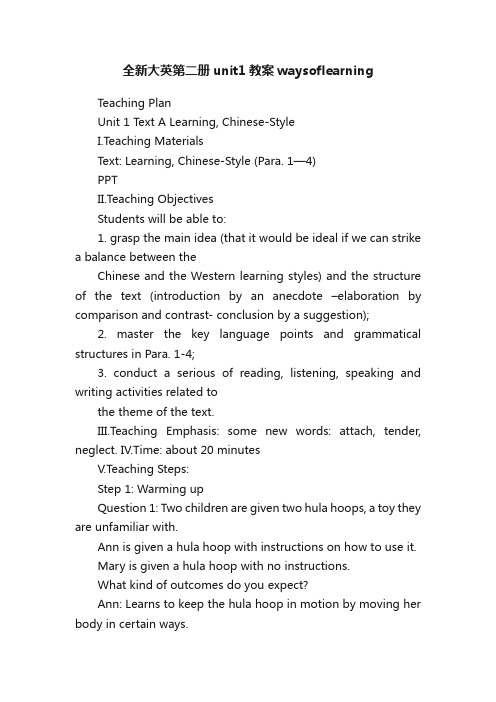
全新大英第二册unit1教案waysoflearningTeaching PlanUnit 1 Text A Learning, Chinese-StyleI.Teaching MaterialsText: Learning, Chinese-Style (Para. 1—4)PPTII.Teaching ObjectivesStudents will be able to:1. grasp the main idea (that it would be ideal if we can strikea balance between theChinese and the Western learning styles) and the structure of the text (introduction by an anecdote –elaboration by comparison and contrast- conclusion by a suggestion);2. master the key language points and grammatical structures in Para. 1-4;3. conduct a serious of reading, listening, speaking and writing activities related tothe theme of the text.III.Teaching Emphasis: some new words: attach, tender, neglect. IV.Time: about 20 minutesV.Teaching Steps:Step 1: Warming upQuestion 1: Two children are given two hula hoops, a toy they are unfamiliar with.Ann is given a hula hoop with instructions on how to use it.Mary is given a hula hoop with no instructions.What kind of outcomes do you expect?Ann: Learns to keep the hula hoop in motion by moving her body in certain ways.Mary :( 1) explores the hoop and discovers it's big enough to step through.(2) Balances the hoop between two objects and practices kicking a ballthrough the hoop.How do you comment on these two outcomes? Which one do you think is Chinese style in learning?Question 2: What’s the difference between Chinese and American ways to learn to accomplish a task?Chinese:Show a child how to do sth. or teach by holding his hand.(passive receptor, teacher-based)Americans: Teach children to rely on themselves for solutions to problems. (active learner / creator, student-based) Step 2: Text OrganizationPart 1 (Para. 1-5): The Chinese staff helps Benjamin to place the key.Part 2 (Para.6-13): T he author’s thoughts about different approaches to learningin China and the West.Part 3 (Para. 14): The author gives a suggestion of a more rational approach tofostering creativity and basic skills.Step 3: Text Analysis (Part 1)Task 1: How does the author introduce the topic in Text A?In this text, the author introduces the topic by an incident / anecdote of teaching a child to place a key into a slot. (a key-slot anecdote)There are several ways to introduce a topic (theme).Stating the topic directly.Posing a question.Quoting a famous saying.Relating an anecdote or an incident.Task 2: Scan Part 1 and find answers of the following questions:(1). Where and when did the incident take place?Jinling Hotel in Nanjing, in the spring of 1987.(2).Who are the main characters in this incident?The author/narrator, his wife Ellen, their son Benjamin, and hotel staff.(3).What is the attitude of the author and his wife toward the key-slot anecdote?They let Benjamin explore and enjoy himself.(4).What is the attitude of the hotel staff toward Benjamin’s efforts?They held his hand and taught him how to insert the key into the slot correctly. Step 4: Detailed study of Part 1(Para.1—4)1. attach: fasten or join (one thing to another)attach sth. to sth. be attached toE.g. Make sure that the stamp is firmly attached to the envelope before you mail it.Match English phrases with their Chinese equivalents:adapt…to 使适应于apply to 向(某人)申请confess to 承认,忏悔contribute to 捐献, 捐赠; 有助于correspond to 相当于; 相符, 符合relate to 有关, 涉及subject to 使遭受,使服从yield to 投降, 让步2. tender: a. young; gentle and loving; sensitive; easily damaged or hurt年幼的;温柔的; 敏感的; 易受伤害的Collocation:tender plants / shoots 娇嫩的树木 / 幼芽a tender subject 软心肠a tender heart 敏感的话题tender age 年幼3. not in the least: not at all小男孩似乎一点也不怕狗。
全新版大学英语2_教案
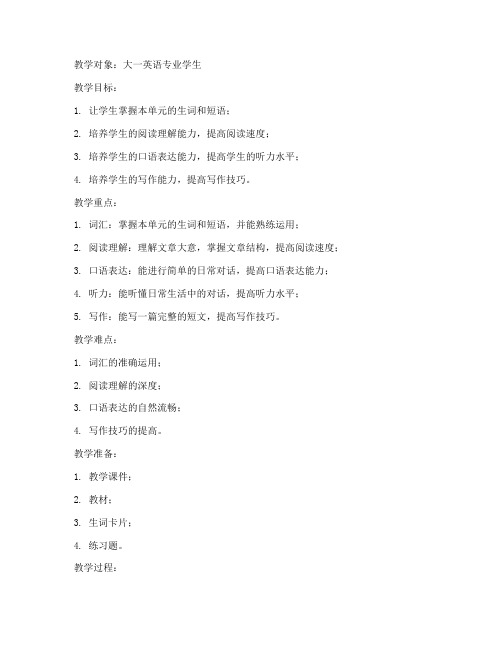
教学对象:大一英语专业学生教学目标:1. 让学生掌握本单元的生词和短语;2. 培养学生的阅读理解能力,提高阅读速度;3. 培养学生的口语表达能力,提高学生的听力水平;4. 培养学生的写作能力,提高写作技巧。
教学重点:1. 词汇:掌握本单元的生词和短语,并能熟练运用;2. 阅读理解:理解文章大意,掌握文章结构,提高阅读速度;3. 口语表达:能进行简单的日常对话,提高口语表达能力;4. 听力:能听懂日常生活中的对话,提高听力水平;5. 写作:能写一篇完整的短文,提高写作技巧。
教学难点:1. 词汇的准确运用;2. 阅读理解的深度;3. 口语表达的自然流畅;4. 写作技巧的提高。
教学准备:1. 教学课件;2. 教材;3. 生词卡片;4. 练习题。
教学过程:一、导入1. 教师简要介绍本单元的主题和内容;2. 学生自由讨论,分享自己对主题的理解。
二、生词教学1. 教师带领学生朗读生词,并解释词义;2. 学生跟读,加深对生词的记忆;3. 教师布置作业,要求学生课后熟记生词。
三、阅读理解1. 学生阅读课文,了解文章大意;2. 教师提问,检查学生对文章的理解程度;3. 学生分组讨论,分享自己的观点;4. 教师总结,解答学生疑问。
四、口语表达1. 学生进行角色扮演,模拟课文中的对话;2. 教师指导学生注意口语表达的流畅性和准确性;3. 学生展示自己的表演,互相评价。
五、听力训练1. 学生听录音,完成听力练习;2. 教师讲解听力技巧,提高学生的听力水平;3. 学生再次听录音,巩固听力内容。
六、写作训练1. 教师布置写作任务,要求学生根据课文内容写一篇短文;2. 学生完成写作,教师批改并给予指导;3. 学生展示自己的作品,互相评价。
七、总结与作业1. 教师对本节课的内容进行总结;2. 布置课后作业,要求学生复习生词,预习下一课内容。
教学反思:本节课通过多种教学手段,帮助学生掌握了本单元的生词、短语和语法知识,提高了学生的阅读理解、口语表达和写作能力。
大学英语(全新版)第二册电子教案
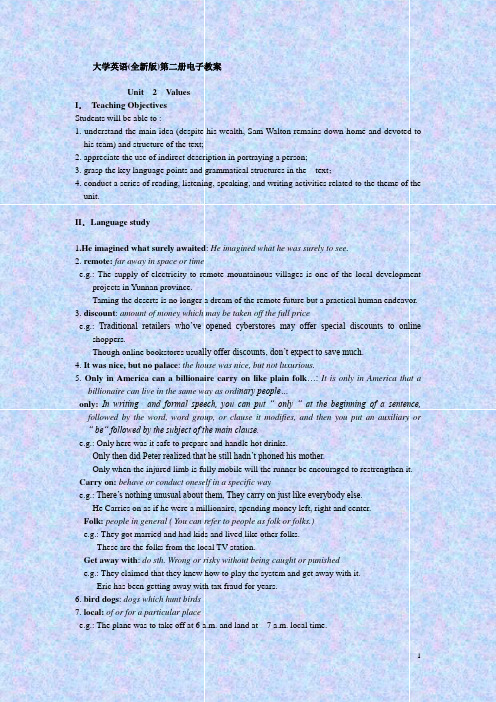
大学英语(全新版)第二册电子教案Unit 2 ValuesI.T eaching ObjectivesStudents will be able to :1. understand the main idea (despite his wealth, Sam Walton remains down-home and devoted to his team) and structure of the text;2. appreciate the use of indirect description in portraying a person;3. grasp the key language points and grammatical structures in the text;4. conduct a series of reading, listening, speaking, and writing activities related to the theme of the unit.II.Language study1.He imagined what surely awaited: He imagined what he was surely to see.2. remote:far away in space or timee.g.: The supply of electricity to remote mountainous villages is one of the local developmentprojects in Y unnan province.Taming the deserts is no longer a dream of the remote future but a practical human endeavor.3. discount: amount of money which may be taken off the full pricee.g.: Traditional retailers who’ve opened cyberstores may offer special discounts to onlineshoppers.Though online bookstores usu ally offer discounts, don’t expect to save much.4. It was nice, but no palace: the house was nice, but not luxurious.5. Only in America can a billionaire carry on like plain folk…: It is only in America that abillionaire can live in the same way as ordi nary people…only:In writing and formal speech, you can put “ only “ at the beginning of a sentence, followed by the word, word group, or clause it modifies, and then you put an auxiliary or “ be” followed by the subject of the main clause.e.g.: Only here was it safe to prepare and handle hot drinks.Only then did Peter realized that he still hadn’t phoned his mother.Only when the injured limb is fully mobile will the runner be encouraged to restrengthen it. Carry on: behave or conduct oneself in a specific waye.g.: There’s nothing unusual about them, They carry on just like everybody else.He Carries on as if he were a millionaire, spending money left, right and center.Folk:people in general ( You can refer to people as folk or folks.)e.g.: They got married and had kids and lived like other folks.These are the folks from the local TV station.Get away with: do sth. Wrong or risky without being caught or punishede.g.: They claimed that they knew how to play the system and get away with it.Eric has been getting away with tax fraud for years.6. bird dogs: dogs which hunt birds7. local:of or for a particular placee.g.: The plane was to take off at 6 a.m. and land at 7 a.m. local time.Three-quarters of the investment needed to host the Olympics world be borne central and local government8.treatment: the way you deal with sb. or behave towards them (followed by of )e.g.: Like everyone else, I resent his cruel treatment of his old farther.The old woman suffered from bad treatment at the hands of her sons. None of them were willing to take care of her.9. by\from all accounts:according to what everyone sayse.g.: Tom, by all accounts, is a super teacher.The Chinese football team will play the Koreans tonight. It should be a match worth watching, by all accounts.10.cheerful: (of sb.) happy in a lively, energetic way; (of sth).making you feel happye.g.: One of the reasons why she is successful is that she is able to remain cheerful in a crisis.They are both cheerful in spite of their colds.I like songs with cheerful tunes.11. Blend in\into: If sb.blends into a particular group or situation, or if they blend in, they seem to belong there or are not noticeable, because their behavior is similar to that of the other people involved. (used in the patterns: blend in; blend into sth.; blend in with sth.)e.g.: What he said reinforced my determination to blend in with my surroundings.As a newly-appointed manager, he was not sure whether he could blend in.The painter blended in with the crowd at the art sale.12.throw one’s weight around: behave in an aggressively arrogant waye.g.: Mr. Smith is not much of a manager. He always throws his weight around.Folks don’t like their ch airman as he always throw his weight around.13. reserve:1) order or book ( a seat, book, room, table, etc.)e.g.: The service at that five-star restaurant is excellent. I’ll reserve a table for five there.Demand will be huge, so ask your friends to reserve tickets for the concert.2) keep for a special use (used in the pattern: be reserved for sb.\sth..)e.g.: In the United States lanes are reserved for cares with more than one occupant.Some seats on the buses are reserved for the old.14. “Look, he’s just not that way.” : You see, he is not the sort of person to reserve seat forhimself.15. open up: unlock and open the door so that people can get ine.g.: Open up, or I break in.They open the school up at 7:45 a,m, so that students can have more sleep.16. It buried the Forbes list at the bottom of page 2. :The Forbes list was arranged at thebottom of page 2 in the Benton County Daily Democrat so that it could not be found easily.17. headline: that title of a news paper article, printed about the article in large letterse.g.: Headlines in the newspaper are arranged so that they attract attention.The headlines in the newspapers were to please millions of people in China: Beijing to host the 2008 Olympic Games.18.hold to : keep toe.g.: John holds to his belief that you can be successful as long as you work hard.She always holds passionately to the view that her mother is an angel.19. stock: shares of a company that are sold to investorse.g.: Y ou’d bette r get professional advice before buying stocks or bonds.After a dull start, stock prices moved ahead again yesterday.20. on the run:continuously active and moving about; try to avoid being capturede.g.: I have been on the run all day and I am exhausted.He has to be on the run from one to another to get the permit to open a take-away restaurant.He is on the run from the police.21. steer clear of: keep away frome.g.: Children are told to start clear of troublemakers.Members of the club steer of controversial issues such as religion.22. but the real story in his mind is…:But what is always on his mind is…23. make up: form the whole of ( sth.)e.g.: Women make up nearly 50% of university entrants.The college is made up of fourteen departments and five research centers.24. liable: likely ( to do sth.)e.g.: It’s liable to snow heavily tomorrow.The sports meeting is liable to be postponed until next week because of the bad weather.25. as laid down…: as establishede.g.: lay down: officially establish a rule, or officially state the way which sth. must be doneConditions for membership are laid down in the soccer club rules.The school authorities have issued a new booklet laying down regulations for students. 26. loyalty: the quality of staying in your friendship or support for sb.: a strong feeling that onewants to be faithful to sb.\sth. (followed by to )e.g.: My father is a soccer fan. His loyalty to the local team has taken him all over the countryto see them play.e.g.: One his mind was made up, General Lee never changed his loyalty to the South27. system: 1) set of ideas, theories, principles, etc. according to which sth. is donee.g.: Most of the teachers are doing research work, trying to find a good system of teachingEnglish.The classification of the books in the library follows the Dewey Decimal System.All the employees are required to work on an eight-hour system.2) group of things or parts working together as a wholee.g.: With the further development of automation, more complicated control systems havecome into being.Manned space vehicles have life-support systems designed to meet all the physical needs of the crew.28. cut prices and margins to the bone: reduce prices and margins considerably or dramatically29. qualify:have or give (sb.) a legal right ( to sth.\to do sth.) followed by for or infinitive toe.g.: A few useful skills---English teaching, for example----qualified foreigners for work visa.Highly trained staff are well qualified to give practical advice to students when they select courses.30. option:1) (in business) an agreement or contract that gives sb. the right to buy or sell sth.such as property or shares at a future datee.g.: With cash, stock options and the promise of vast resources, Microsoft has attracted facultyelites to its research center.Jones has taken an option on that house.2) sth. you can choose to doe.g.: She has the option of entering graduate school or starting her professional career.Analysts say that the launch of the euro offers a new and attractive option.31. scholarship:(award of a ) grant of money to a scholare.g.: He can’t afford to go to college f he doesn’t win a scholarsh ip.Some companies have set up scholarship for both students and teachers at our university.32. and the like: and other things of the same sorte.g.: If you mention particular things or people and then ass “ and the like” , you are indicatingthat there are other similar things or people that can be included in what you are saying.Many students are also keeping fit through jogging, aerobics, weight training, and the like.Always carry your passport, money and the like with you while you are traveling abroad.33. cultivate: 1) make a special effort to establish and develop ( sth .)e.g.: They encourage students to cultivate special interests in theoretical physics.Some students try to cultivate a love of art.2) prepare land and grow crops on ite.g.: They cultivated 500 acres in the suburb.The remote area has barely been cultivated for decades.34. reward:give sth. to ( sb. ) in return for work or services (used in the pattern: reward sb.forsth. With sth.)e.g.: The officer is to be rewarded for his efforts with promotion to the rank of inspector.If you do well in the final exams, I will reward you with a trip to Hong Kong35.retire: ( cause to ) stop working at one’s job, usu. Because of age (followed by from)e.g.: Although their careers are important they plan to retire at 50.The school had to employ the retired teacher to give classes.36. . …who was stunned at such generosity after the stingy employer he left to joinWal-Mart:… who, having left hi s stingy employer to join Wal-Mart, was shocked at such generosity by Waltone/get aboard: (AmE, infml) joine.g.: New employees who came aboard in the last six weeks have not been tested.This is her second promotion since coming aboard.38. the way they’re treated:how they’re treatedWhen “the way”is followed by a defining relative clause, this clause can be either a “that”clause or a clause beginning with “in which” . For example, you can say “the way she told the story”, “the way that she told the story”,“the way in which she told the story”. There is no difference in meaning.e.g.: Scientists have spent years studying the way the brain retains information.The information highway will have an unimaginable impact on the way people communicate with each other.39.deserve: be sth. or have done sth. For which one should receive ( a reward, special treatment,etc.) ; be entitled to ( not used in the continuous tense )e.g.: I am only partly responsible for the success for this book, m collaborator deserve morecredit.They deserve a good salary for the job hey do. Mary deserves a reward for her efforts.。
(完整版)全新大学英语第二版BOOK1-UNIT2教案

Teaching Plan of Unit 1, Book 1FriendshipText A All the Cabbie Had Was a LetterTeaching Objectives:Students will be able to1.grasp the main idea (never delay expressing your true feelings to a friend) and structure of Text A(developing a story around a letter);2.appreciate characteristic features of spoken English as demonstrated in Text A (spoken English ismuch more informal than written English);3.master the key language points in Text A and learn how to use them in context;4.understand the cultural background related to the content;5.express themselves more freely on the theme of Friendship after doing a series of theme- relatedreading, listening, speaking and writing activities;6.Write a personal letter in an appropriate way.Time Allotment:4-5 class hoursTeaching Methodology: student-centered; group work, pair workTeaching Procedures:I. Pre-reading tasks1. Think- pair-share: Ask students to brainstorm proverbs about friendship.Suggested answers:Friends are like the stars on a cloudy night. You can't always see them, but they are there. Friendship cannot stand always on one side.Between friends all is common.False friends are worse than open enemies.A friend to all is a friend to none.The friendship that can end was never real.A friend is easier lost than found.A friend in need is a friend indeed.Friends are like wine; the older, the better.Good company on the road is the shortest cut.True friendship is like sound health; the value of it is seldom known until it is lost.Ask students to choose the proverb they like best and give reasons.2. Survey--- Do you often write letters to your friends?Question and answer: Which do you think is the best way in expressing our innermost feelings?II. Text Learning:Task 1: Topic-related PredictionWhat does a cabbie do?What is a letter used for?Who wrote the letter to the cabbie?Why was all the cabbie had only a letter?Task 2: Scanning (see PPT)Scan Text A and decide which of the following statements is the theme.1. One should keep in touch with his friends.12. Never delay expressing your true feelings to a friend.3. A true friend will stand by you forever.4. Late is better than never.Task 3: Group work: Divide the text into smaller parts and assign them to different groups. Ask the students to work in groups and do the following:▪Step 1: Read the assigned part, and try to understand its meaning.▪Step 2: Ask and tell each other about the difficulties in understanding this part.▪Step 3: Make a list of useful words and phrases.▪Step 4: Choose one member to make a short report to the class.Task 4: Language study1) T leads the students’ attention to the colloquial sentences:▪Go ahead and finish your letter.▪I’m not much of a hand at writing.▪We were kids together, so we go way back.▪You kind of lose touch even though you never forget.▪It’s no fun to lose any friend.2) Study the language points and practice them.be lost in; available; go ahead; know\ learn by heart; estimate; might as well\ may as well;keep up; correspondence; practically; neighborhood; kind of\ sort of; lose touch with; come up;urge; postpone; reference; absolutely; reunion; hang out; every now and then; choke up;destination; skip; right away3) Game: Flash Cards (Vocabulary Activity)After practicing the above, ask Ss to work in pairs▪Step 1: Through discussion, delete those they have already grasped.▪Step 2: Divide the rest of the words and phrases into two groups, and each student will be deal with one of the group. Write down the words and phrases on cards ( one on each card). Find out their English explanations, and write them down on the back of the corresponding cards.▪Step 3: Practice: One gives the explanation, and the other guesses the word or phrase.▪Step 4: Ss exchange roles and go on practicing.▪III. Post-reading activities:1. Dictogloss (an activity that combines elements such as dictation, cooperation, oral practice and grammar etc.):Step 1: T prepares a paragraph either related to the topic or a grammar item, writes down the difficult words on the board if there are any;Step 2: First listening: Ss are required to listen only, without writing anything;Step 3: Second reading: Ss are required to write down the key words, without worrying about the spelling mistakes;Step 4: Ss work in groups to reconstruct the article, trying to write down every sentence with correct spelling and sentence structure.Step 5: Ask Ss to write what they have got on a big piece of paper, or share with the class orally; Step 6: T shows the original text, comments on what the students have done and explains the grammar points.22. Writing:Directions: Write a letter (at least 120 words) to your best friend, following the outline given below:1)Your feeling about your new life in the university;2)How you miss him\ her and the time you had together.3)Inviting him\ her to pay you a visit.3. Suggested song: Cry on my shoulder4. Suggested movie: Mary and Max3。
全新版大学英语第二册教案

一、课题《全新版大学英语第二册》二、教学目的1. 培养学生阅读理解能力,提高英语水平。
2. 培养学生听说能力,增强口语表达和听力理解能力。
3. 培养学生写作能力,提高写作技巧和表达能力。
4. 培养学生翻译能力,提高翻译技巧和翻译水平。
三、课型综合课四、课时2课时五、教学重点1. 阅读理解:掌握文章主旨、段落大意、细节信息。
2. 听力理解:提高听力技巧,正确理解对话和短文。
3. 写作:掌握写作技巧,提高写作水平和表达能力。
4. 翻译:掌握翻译技巧,提高翻译水平和翻译质量。
六、教学难点1. 阅读理解:理解长难句,把握文章结构。
2. 听力理解:准确理解对话和短文中的隐含意义。
3. 写作:提高写作水平,使文章结构清晰、表达流畅。
4. 翻译:提高翻译技巧,使译文准确、通顺。
七、教学过程(一)导入新课1. 教师简要介绍本节课的教学内容和目标。
2. 学生回顾上一节课所学内容,提出疑问。
(二)讲授新课1. 阅读理解(1)学生阅读课文,了解文章主旨和段落大意。
(2)教师引导学生分析文章结构,理解长难句。
(3)学生回答问题,巩固所学知识。
2. 听力理解(1)学生听录音,回答问题,提高听力技巧。
(2)教师分析听力材料,讲解听力技巧。
3. 写作(1)教师讲解写作技巧,引导学生掌握写作方法。
(2)学生进行写作练习,教师批改并给予指导。
4. 翻译(1)教师讲解翻译技巧,提高学生翻译水平。
(2)学生进行翻译练习,教师批改并给予指导。
(三)巩固练习1. 阅读理解:完成课后练习题,巩固所学知识。
2. 听力理解:听录音,回答问题,提高听力技巧。
3. 写作:完成写作练习,提高写作水平。
4. 翻译:完成翻译练习,提高翻译水平。
(四)归纳小结1. 教师总结本节课所学内容,强调重点和难点。
2. 学生回顾所学知识,提出疑问。
(五)作业布置1. 完成课后阅读练习。
2. 练习听力材料,提高听力技巧。
3. 撰写一篇短文,提高写作水平。
4. 完成翻译练习,提高翻译水平。
全新版大学英语2_教案
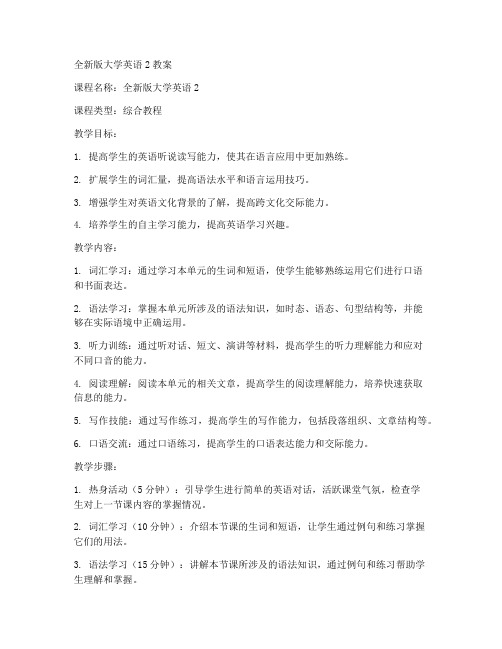
全新版大学英语2教案课程名称:全新版大学英语2课程类型:综合教程教学目标:1. 提高学生的英语听说读写能力,使其在语言应用中更加熟练。
2. 扩展学生的词汇量,提高语法水平和语言运用技巧。
3. 增强学生对英语文化背景的了解,提高跨文化交际能力。
4. 培养学生的自主学习能力,提高英语学习兴趣。
教学内容:1. 词汇学习:通过学习本单元的生词和短语,使学生能够熟练运用它们进行口语和书面表达。
2. 语法学习:掌握本单元所涉及的语法知识,如时态、语态、句型结构等,并能够在实际语境中正确运用。
3. 听力训练:通过听对话、短文、演讲等材料,提高学生的听力理解能力和应对不同口音的能力。
4. 阅读理解:阅读本单元的相关文章,提高学生的阅读理解能力,培养快速获取信息的能力。
5. 写作技能:通过写作练习,提高学生的写作能力,包括段落组织、文章结构等。
6. 口语交流:通过口语练习,提高学生的口语表达能力和交际能力。
教学步骤:1. 热身活动(5分钟):引导学生进行简单的英语对话,活跃课堂气氛,检查学生对上一节课内容的掌握情况。
2. 词汇学习(10分钟):介绍本节课的生词和短语,让学生通过例句和练习掌握它们的用法。
3. 语法学习(15分钟):讲解本节课所涉及的语法知识,通过例句和练习帮助学生理解和掌握。
4. 听力训练(20分钟):播放听力材料,让学生进行听力练习,然后讨论答案,提高学生的听力理解能力。
5. 阅读理解(20分钟):让学生阅读本节课的相关文章,通过回答问题、讨论等方式提高学生的阅读理解能力。
6. 写作技能(15分钟):布置写作任务,指导学生进行写作练习,然后互相批改、讨论,提高学生的写作能力。
7. 口语交流(10分钟):组织学生进行口语练习,如角色扮演、小组讨论等,提高学生的口语表达能力和交际能力。
8. 总结与作业布置(5分钟):对本节课的内容进行总结,布置作业,提醒学生进行自主学习。
教学评价:1. 课堂参与度:观察学生在课堂上的积极参与程度,包括发言、讨论等。
全新版大学英语(第二版)听说教程2-unit3电子教案PPT课件
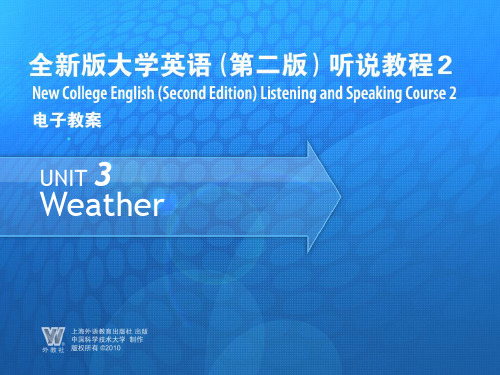
Unit 3 Weather
Pre-listening Tasks
Listening Tasks
Language Focus
Pair Work
Speaking Tasks
Additional Question for Discussion
Do you think it is possible or impossible to give accurate weather forecasts?
Unit 3 Weather
Pre-listening Tasks
Listening Tasks
Language Focus
Pair Work
Speaking Tasks
• It’s going to be a cold day with damaging northwesterly winds / hot and humid day with a high of 36 degrees Centigrade.
Unit 3 Weather
Listening Strategy
2. a. When did the storm start and how long did it last? I_t_s_t_a__r_t_e_d__a__r_o_u_n__d__8__p_._m___._a__n_d__l_a_s_t_e__d__f_o_r__a_b__o_u_t__t_h_r_e__e__
• It’s fine / sunny / warm / rainy / cloudy / snowy / windy / freezing / foggy / dry / chilly today.
• The air is close / oppressive. • A storm is coming up / building up / in the making. • It’s raining off and on / cats and dogs. • The rain / snow has stopped / let up. • It’s going to cloud over.
大学英语二电子教案
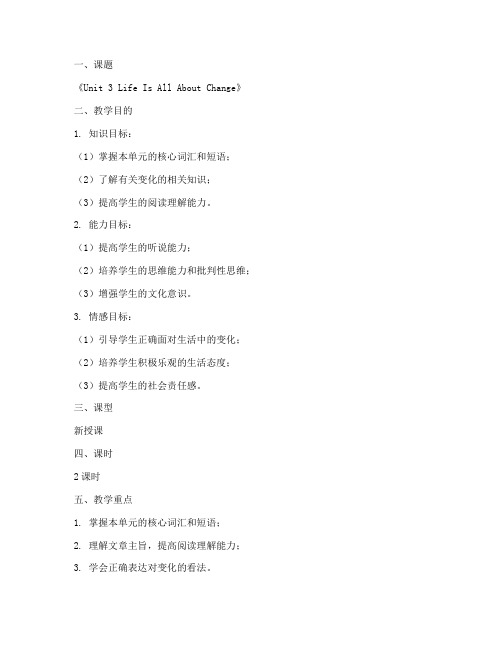
一、课题《Unit 3 Life Is All About Change》二、教学目的1. 知识目标:(1)掌握本单元的核心词汇和短语;(2)了解有关变化的相关知识;(3)提高学生的阅读理解能力。
2. 能力目标:(1)提高学生的听说能力;(2)培养学生的思维能力和批判性思维;(3)增强学生的文化意识。
3. 情感目标:(1)引导学生正确面对生活中的变化;(2)培养学生积极乐观的生活态度;(3)提高学生的社会责任感。
三、课型新授课四、课时2课时五、教学重点1. 掌握本单元的核心词汇和短语;2. 理解文章主旨,提高阅读理解能力;3. 学会正确表达对变化的看法。
六、教学难点1. 理解文章中复杂句子的结构;2. 学会运用所学知识进行听说练习。
七、教学过程第一课时1. 导入新课(1)教师通过提问引入话题:“What do you think of changes in your life?”(2)学生分享自己的观点,教师总结。
2. 阅读理解(1)学生自主阅读课文,完成课后练习;(2)教师讲解课文难点,如复杂句子的结构、生词短语等;(3)学生复述课文,教师点评。
3. 巩固练习(1)学生分组讨论,总结文章主旨;(2)教师提问,检查学生对文章内容的理解;(3)学生用所学词汇和短语造句。
第二课时1. 听力训练(1)播放课文听力材料,学生听后回答问题;(2)教师讲解听力技巧,如注意关键词、预测等;(3)学生复述听力材料,教师点评。
2. 口语练习(1)学生分组讨论,分享自己面对变化时的感受和应对策略;(2)教师点评,引导学生正确表达观点;(3)学生进行角色扮演,模拟现实生活中遇到的变化场景。
3. 归纳小结(1)教师总结本节课所学内容;(2)学生分享自己的学习心得;(3)布置课后作业,巩固所学知识。
八、板书设计Unit 3 Life Is All About Change1. Changes in life2. The stages of life3. Dealing with changes4. Vocabulary: adapt, transition, cope with, etc.九、教具1. 多媒体课件2. 听力材料3. 录音笔4. 课后练习十、作业安排1. 阅读课文,完成课后练习;2. 复习本单元核心词汇和短语;3. 观看与变化相关的英文电影或纪录片,提高自己的听说能力。
- 1、下载文档前请自行甄别文档内容的完整性,平台不提供额外的编辑、内容补充、找答案等附加服务。
- 2、"仅部分预览"的文档,不可在线预览部分如存在完整性等问题,可反馈申请退款(可完整预览的文档不适用该条件!)。
- 3、如文档侵犯您的权益,请联系客服反馈,我们会尽快为您处理(人工客服工作时间:9:00-18:30)。
大学英语(全新版)第二册电子教案Unit 3 The Generation GapText A : Father Knows Better I.Teaching objectives:Students will be able to:1. understand the main idea (Father meddled in children’s affaires withgood intentions, but only to find his efforts unwelcome) and structure (three settings, three scenes) of the text;2.appreciate the basic elements of a play;3. grasp the key language points and grammatical structures in the text;4. conduct a series of reading, listening, speaking and writing activities related to the them of the unit.II.Pre- reading tasksPair interview1. When are your parent’ birthdays and their wedding anniversary?2. Do your parents celebrate your birthday? How about their own birthday celebration?3. In your parents; eyes, what are you interested in?4. In your eyes’, what are your parents interested in?5. In what areas do your parents want you to improve?6. In what ways do you want your parents to improve?7. Tell of an instance when your parents and you disagree oversomething.III.Language study:1. location:a place or positione.g.: Witness showed the police the exact location of the accident.The school is going to move to a new location.2.Down Right:special term for drama. In this text there are other terms , such as “Down Left”. They refer to different part of the stage.3. embarrass: make (sb.) feel awkward or ashamede.g.: I chose my words carefully in order to avoid embarrassing anyone.It embarrassed him that he had to give a talk in front of a lot of people.Adj. embarrassed: (sb.) shy, guilty or ashamed about sth.I was really embarrassed when I knocked the cup of tea over myteacher.4. waiting tables: working as a waiter and serve others with food.5 .dumb: (informal) 1)foolishe.g.: He was so dumb that he left his keys at home again.Don’t be so dumb. You can’t get a loan from the bank if you relaid-off.2) unable to speakChildren born deaf and dumb can nowadays be taught to speak and lip-read.Martin was born dumb, but he has still managed to get a good job.6. in unison: acting in the same way at the same timee.g.: The children find it difficult to play their instruments in unison.The international community is ready to work in unison against terrorism.7. consist of: be made up ofe.g.: The book consists of essays written over the last twenty years.The committee consists of scientists and engineers8. a man –to-man talk: a talk that takes place between two men. esp.two men who need to discuss a serious matter.9. …life’s dangerous sea: Here the author uses a metaphor. Hecompares life to an arduous sea voyage.10. fade: 1)lose color or brightnesse.g.: All color fades--------especially under the impact of directsunlight.The sunlight gradually faded.2)disappear slowlye.g.: Her enthusiasm for early-morning exercises faded as the weatherwas getting colder and colder.They watched the mountains fade into the darkness.11. overall: 1) in general (adv.)e.g.: The college has few ways to assess the quality of educationoverall.Overall, I like Marie, despite her faults.2) including everything ;total ( only before noun)Cut down your overall amount of extracurricularactivities and spend more time on your studyingThe overall length is 15 feet.12. trade (sth. ) for ( sth .else): exchange ( sth. for (sth. else)e.g.: The farmers traded farm produce for manufactured goods andmoney.I will trade my stamp collection for your model boat.13. keep/leave (sb.) in suspense: delay telling (sb.) what they are eagerto know.e.g.: The audience is kept in suspense to the very end of the play.I won’t keep you in suspense any longer. Here are the results ofthe mid-term exam.14. interrupt: stop (sb.)from continuing what they are saying or doinge.g.: My daughter kept you interrupting me whenever I spoke.I’m sorry to interrupt, but you’re not really answering myquestion.Nobody was allowed to interrupt them while the meting was inprogress.15. bet:be suree.g.: I bet she was late for the meeting on purpose.I bet he’ll change his mind again.16. distract:take (sb.’s attention ) away from sth. esp. for a short time(used in the pattern: distract sb./sth.: distract sb./sth.from )e.g.: Tom admits that playing computer games sometimes distracts himfrom his homework.A disturbance outside my dormitory distracted my attention.Passengers are requested not to distract the driver’s attention whilehe is driving.17. My treat:Her it means that father is going to invite Dan to dinnerand pay for it as a friendly act.18.Very short with her: If you are “short with sb.”, you speak brieflyand rather rudely to them because you are impatient or angry19. glorious: wonderfule.g.: It seems a pity to be indoors on such a glorious day.Vivid memories came flooding back of the glorious, romantic sophomore year.20.hand down: give or leave to people who are younger or come latere.g.: The art of story –telling is handed down from mother to daughter.She had some jewellery which had been handed down from her grandmother.21. at any rate: whatever may happen; in any case(You use at any rate to indicate that the important thing what you are saying now, and not what was said before.)e.g.: At any rate, you survived the car accident.At any rate, let me thank you for all you did for me.Well, at any rate, let me thank you for all you did for me.munity:the people living in one place, district, or country,considered as a wholee.g.: Police work to prevent crime and to protect the lives and propertyof the people in the community.College students have learned a lot in community service.23. welfare: good health, happiness, prosperity, etc. of a persone.g.: Parents are responsible for the welfare of their children.Employers should be concerned with the welfare of their employees.24. narrow down: make ( a list of things ) smaller (followed by to )e.g.: Over a hundred applicants will be narrow down to a short list offive candidates.The police department attempted to narrow down the list ofsuspects.25. exhaust: 1) make ( sb.) very tired, either physically or mentallye.g.: He took to walking long distances in an attempt to physicallyexhaust himself.Four hours’ work almost exhausted her.2) used up completely25. repeatedly: again and againe.g.: We have repeatedly requested that staff should not be allowed tosmoke I the office.I repeatedly warn you not to take the job.27. come over: (of a feeling ) affecte.g.: A great sense of calm came over me when I realized that I was nolonger responsible for the situation.He has never been so rude to me. What’s come over him?28. Why, back I my day…: Well, when I was young… (we didn’t behavelike that) It implies a gap between the younger generation and the older generation.)29. swallow: cause or allow ( esp. food or drink ) to go down the throat;hide or suppress a feelinge.g.: I tried to swallow, but my mouth was too dry.Chew your food properly before swallowing it.Susan had to restrain herself and swallow hard in her position as ahousemaid30. frank: showing one’s thoughts and feelings openly ( followed by with/about )e.g.: To be frank with you, I think you are making a mistake.Our discussion were frank and fruitful.Do you want my frank opinion?It is clear that my students have been frank with me.31. interference: unwanted or unnecessary involvement in sth. (followedby in/with )e.g.: Her parents’ continual interference in our affairs irritated me.Your interference in his private affairs is unreasonable.32. constant: 1) without stoppinge.g.: I have had a constant headache for three days.He left the office because he could no longer stand the constant gossip.2 )unchangingDriving at a constant speed saves gas.The temperature in the museum is maintained at a constant 16 degrees Celsius.The price of the product is not constant but varies with supply and demand.33. in charge of: having control ( over ) or responsibility ( for)e.g.: Who is in charge of the club’s finances?The executive in charge of the project was having some difficulties in negotiating terms with the contractors.He was left in charge of the shop while the manager was away.34. exceptional: unusuale.g.: Ann showed exceptional musical ability at the age of four.Stephen was pretty good, but not exceptional.35. fill out : complete ( a document or a form ) by supplying requiredinformation /to fill out a form means the same as to fill in a form. e.g.: Please fill out the application form and send it back by January 10.The policeman filled out a report of the accident.The old man filled out the form and signed it at the bottom.36.Proof: evidence or facts that are sufficient to establish a thing astrue or believablee.g.: The executive produced documents in proof of his claim.Her fingerprints left on the scene were a proof of her guilt.Researchers in America have found proof that non-smokers can develop cancer by working in smoky rooms.I know you visited the house. I have proof.37. talented:giftede.g.: Jackie Chen has a huge army of young fans , and is extremelytalented.Mozart was a talented musician.38. Junior: 1) younger ( followed by to )(abbrs.: Jr., used after the name of a person who has the same name as his father, e.g. Tom Brown, Jr.)e.g.: Jane is several years junior to her husband.Do you want John Brown Senior or John brown Junior, the father or the son?2) lower in rank than othersHaving worked for five years, Jack still a junior clerk in the office.Michael had been a junior clerk for three years before he was promoted to senior clerk.。
